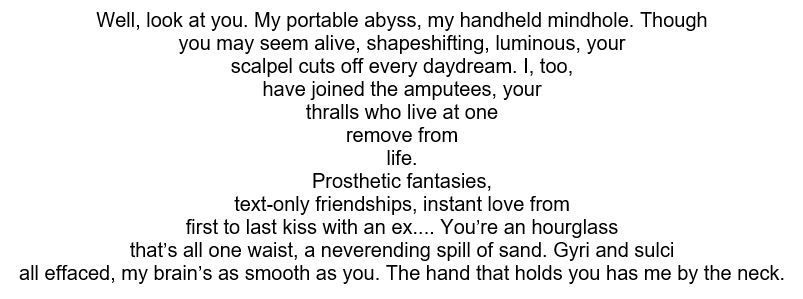
Sydney Lea
Eclipses
Her Husband Told Me
He told me that just a few hours
after they brought their baby home
she insisted he find some old letters
from people he’d never known,
and he’d known her since both were children,
since well before they married.
At one point she studied fruit that had fallen
from their window-tree and declared,
I just counted eighty rotten apples.
Although he searched everywhere,
he never managed to find any letters.
If there were some, where could they be hidden?
He said her brother and two of her sisters
kept wondering what to do next.
They watched her writhe on her twisted sheets
until she teemed with sweat.
Who are the letters from? someone asked,
and that instantly turned her nasty.
They’d never seen her face like that.
She’d always been sweet, almost docile
but now for days she snarled and spat
words that weren’t even sequential:
scourge fame moon cow-dung.
He considered institutions,
but no. For that year he fed the newborn
whenever the poor thing got hungry.
That infant’s a grown man now and she claims
she’s never been more happy.
When we’re with her we don’t recall that time.
I mean, after all, why would we?
–April 9, 2024
I sat in the wood-and-canvas canoe
with my friend Alan and his blond son Billy,
a child– now 61! His father
and I had wondered what might happen
if we fished through the sun’s dramatic retreat.
We wanted something, I guess, some rite
to etch the total eclipse in our minds,
especially Billy’s. We’d had no luck
with the perch, but just as dark settled in,
the boy’s line went taut as a fiddle-string,
his rod bowing deep. I could tell what had preyed
on the minnow-bait by the power of the pull
and the fact that the fish made no lateral run,
merely went on hauling in the same direction
–toward bottom. Wistfulness wouldn’t turn up,
of course, until much later, and never
to Alan, who heartbreakingly died
of cancer only a few months after.
I haven’t seen his son since the funeral.
The darkness came on, but not so full
as to hide the glint off the eel’s slick skin
as I lifted it high enough to yank
the hook and drop it back into water,
whose surface now looked like oxidized brass.
Since that afternoon, a lifetime has passed,
and a newer eclipse is due here in hours.
Why should I envision a sprawl
of seedling flowers in a glassed-in frame?
You can start them in winter. When they’re ready to bloom
in an April like this, you should take them out
and plant them where they’ll get better attention.
Ardent eclipse-watchers swarm our state,
but for me that odd aggregation arrives:
flower, eel, boy, rescinded daylight.
There’s wide-eyed wonder on the young angler’s face,
a fleeting flicker from the serpentine creature,
three small souls rocking in the frail canoe.
And these small words– they coalesce
on a wisp of paper in tenuous sunlight,
which pauses a moment on my worn oak desk.
A former Pulitzer finalist in poetry,
Sydney Lea served as founding editor of
New England Review and was Vermont’s Poet Laureate from 2011 to 2015. In 2021, he was presented with his home state’s highest distinction of its kind, The Governor’s Award for Excellence in the Arts. He has published twenty-four books: two novels, six volumes of personal and three of critical essays, and sixteen poetry collections, most recently
What Shines (Four Way Books, NYC, 2023). His latest book of personal essays,
Such Dancing as We Can, is now available from The Humble Essayist Press, and his second novel,
Now Look, has recently been published by Downeast Books.
